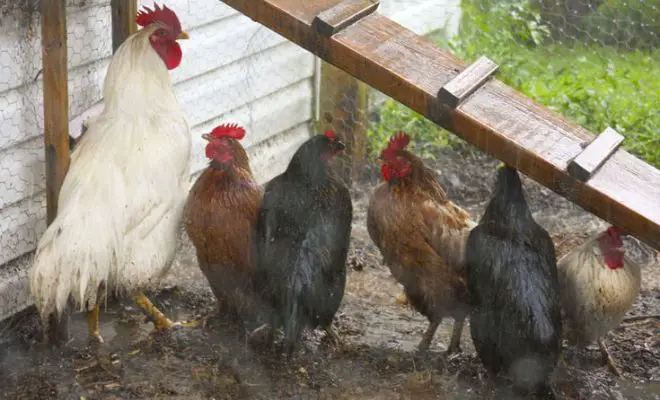Duck Coop Rodent Problem? We Have the Answers!

Keeping your ducks safe and healthy is crucial, and that includes protecting them from unwanted visitors like rats. These rodents can spread diseases, steal food meant for your ducks, and even harm them.
Now, how to keep rats out of duck coop? The easy solution is to seal the coop with a hardware cloth. You can also store food outside the coop, and keep it clean. Natural deterrents like peppermint oil, cayenne pepper, or ultrasonic devices can repel rats. Also, using traps won’t be any less effective method!
Let’s explore various strategies to keep the rats out of the duck coop. We’ll cover essential steps and ideas to keep the duck safe from rat poison!
Table of Contents
How to Keep Rats Out of Duck Coop? Learn Consequences First!

There are a lot of ways to reduce the rat population in your backyard for ducks. And it’s crucial to remove it ASAP!
Rats can transmit diseases harmful to ducks and humans. Rats are more than just annoying pests. Here’s why they’re a big problem:
- They eat duck food, eggs, and even baby ducks, leaving your birds hungry and in danger.
- Their droppings and urine make food and water dirty, spreading diseases to your ducks and you.
- They bring along nasty bugs like lice and fleas, making your birds sick.
- Rats carry diseases that can harm your ducks and even people.
- They damage your coop, chew wires, and dig tunnels that let other animals in.
- Rats stress out your ducks, leading to fewer eggs.
- A rat problem can cause trouble with your neighbors.
Actually, the presence of rats can be stressful and anxiety-inducing for ducks. Therefore, take steps to prevent rats from entering your duck coop.
But how do rats get attracted? Do ducks attract rats?
Ducks do not draw rats directly. However, their presence can make conditions favorable for these rodents. Here’s how:
- Food: Leftover duck feed, scattered grains, and food scraps become easy meals for rats.
- Water: Ducks require clean water, which can also entice thirsty rats.
- Shelter: If the coop isn’t sealed well, it offers rats a cozy hideout and nesting spots.
What are the Signs of Rats in Duck Coop?
Any suspicion that the rats are near the duck coop? Here are the telltale signs that ensure rodents visit your backyard!
You may look for –
- Droppings: Dark brown pellets, about ½ inch long, near food, walls, and corners.
- Gnaw mark: Chewing damage on wood, plastic, feeders, and walls.
- Runways: Greasy trails on walls, floors, or near entry points.
- Burrows: Holes in loose soil or mulch around the coop.
- Dead rats: A sure sign of infestation.
You may listen for –
- Scratching or scurrying noises: Especially at night.
- Unexplained sounds: Any unusual noises coming from the coop.
You can check for –
- Missing duck feed: Less feed than usual, or scattered and wasted.
- Uneaten eggs: Especially if easily accessible to rats.
- Strong musky odor: This signifies a large infestation and rat droppings/urine.
9 Ways to Remove Rodents from the Duck Coop

By following some strategies, you can reduce the risk of rats invading. I would say to take preventive steps rather than solving the concerns.
However, here’s a guide for you!
Maintain Cleanliness
Regularly clean the coop area. So, you need to remove any spilled feed, droppings, or debris.
Securely store feed in tightly sealed containers. Also, keep the coop dry and free from damp bedding. It’s because of the moisture attraction.
Related Article: How To Keep Duck Coop Clean
Sealing the Coop
Hardware Cloth is your primary weapon. Use galvanized steel hardware cloth with a mesh size. It should be no more than ½ inch to line the entire coop. It includes the floor, walls, and roof.
Remember, rats are excellent climbers and burrowers. So, don’t leave any gaps!
Extend the hardware cloth at least 12 inches underground. It’s around the entire perimeter of the coop. This prevents rats from digging tunnels and sneaking in.
Inspect the coop thoroughly for any holes, cracks, or gaps, no matter how small.
These can be entry points for determined rats. Seal them up using hardware cloth, caulk, or other appropriate materials.
Ensure the coop door closes snuggly and latches properly. Consider adding a metal kick plate to the bottom of the door. It’s to deter gnawing attempts.
Making Your Coop Unattractive
Never store duck feed inside the coop. Instead, use a metal feeder with a lid and place it in the run. Remove any uneaten food at night and clean up spills promptly.
Regularly clean out the coop to remove droppings, bedding, and other debris that might attract rats. A clean coop discourages them from setting up camp.
Keep the area around the coop free of debris, overgrown vegetation, and potential nesting sites for rats. This eliminates nearby hiding spots and reduces their interest in your property.
Food Storage
Store feed away from the coop if feasible. Rats can chew through bags and bins. Consider using a treadle feeder that opens only when the ducks step on it.
Natural Deterrents: What is a natural remedy to get rid of rats?
Some people recommend using natural deterrents. For example – peppermint oil, cayenne pepper, or ultrasonic devices to repel rats.
To naturally repel rodents from your duck coop, try these methods:
- Plant lavender around the coop as its scent repels rodents.
- Make a spray with apple cider vinegar, sage, nettle, and basil. Lightly spray it on coop surfaces to deter rodents.
- Plant rose geraniums near the coop. It’s to emit a fragrance disliked by rodents.
- Spray diluted peppermint oil around the coop. You can place soaked cotton balls to repel rodents with a strong scent.
What if you try the red pepper flakes? Using red pepper flakes to deter rats might not work. One duck owner shared that her mother-in-law tried using capsaicin (the compound in peppers) to stop them from chewing on things.
Surprisingly, the rats liked it and licked it off eagerly. So, instead of stopping them, the pepper might attract them even more.
Also, Avoid using rodenticides. Your bird may eat a mouse that has consumed the poison. So, they will also be poisoned. Be careful!
Outdoor Area Maintenance
Trim grass neatly around the coop. Remove any scrap lumber or brush piles nearby. Also, Dispose of empty feed bags or store them away.
Call the Natural Predators
While ducks and chickens do kill some mice, they won’t eliminate an infestation. Rodents are mostly nocturnal, and your birds are asleep during that time.
So, consider introducing barn cats or other natural predators. They’ll help control rodent populations.
Liquid to Reduce Mice
Some strong-smelling liquids, like ammonia, can be harmful to humans and pets. Instead of relying solely on liquids, consider a combination of the strategies I mentioned.
Trapping as a Last Resort: Only if Necessary!
Traps can be used to catch existing rats. But remember, they are not a long-term solution on their own. You must combine trapping with the exclusion.

Consult with a pest control professional or your local wildlife agency for guidance. It’s for selecting appropriate traps and their safe placement.
But, what keeps rodents away permanently? There are no specific points to mention to remove rodents permanently. So, be sure you follow the advice I included.
See the video to get more information about getting rid of rats!
How to Stop Rats Eating Duck Eggs?
Prevent rats from reaching duck eggs by securing the coops. Use galvanized steel hardware cloth with no more than ½ inch mesh.
Ensure nesting boxes are well-constructed without any gaps or holes. Consider using elevated nesting boxes.
Collect eggs frequently to reduce opportunities for rats to find and eat them.
You may follow alternative nesting materials like wood shavings or nesting pads to deter rats.
Do Rats stop ducks laying?
Rats themselves don’t directly stop ducks from laying eggs. However, their presence can indirectly affect egg production.
Well, the problem is stress, nutritional deficiencies, and disease transmission due to rodents.
How Do You Make Homemade Rat Repellent Spray?

The homemade sprays’ ability to repel rats isn’t strongly backed by scientific evidence. While their scents might discourage rats at first, they tend to lose their effectiveness rapidly, and there’s little research on how well they work in the long run.
Is There A Spray to Keep Mice Away?
Some studies suggest certain scents (like peppermint or cayenne pepper) might discourage mice. Even if initially effective, the scents often fade quickly.
Do Ducks Kill Mice or Vice Versa?
It’s unlikely for ducks to catch adult mice because mice are small and quick. Ducks are bigger and usually eat other things like bugs and plants.
But sometimes, a mother duck might try to protect her babies from mice. Or as an omnivore. they may catch the rats.
On the other hand, a rat rarely might go after baby ducks. They attack ducklings and try to eat the dead baby ducks.
But will baby duck eat mice? It’s possible, but not very likely.
Related Articles:
FAQs
You may look at the query section I included below. You’ll get more facts about reducing rats in the yard.
Q. Will rats eat chicken poop?
Yes, rats are not picky eaters and will consume various things, including chicken poop. However, it’s not their preferred food source.
Q. What do rats hate the most?
Rats generally dislike strong smells like peppermint oil, clove oil, and cayenne pepper.
Q. What smell is poisonous to rats?
Some strong smells may be unpleasant for them, but they are not inherently poisonous.
Q. Does naphthalene balls prevent rats?
No. Naphthalene balls are toxic and dangerous to humans and pets.You should not use it for rat control. They are also ineffective in repelling or harming rats.
Q. What kills rats ASAP?
Always prioritize humane methods like traps and consult a licensed pest. control professional. However, it’s not suggested to kill the rats.
Final Word
Keeping rats away from your duck coop is important to keep your ducks safe. You can do this by sealing up any holes in the coop. Also, make sure there’s no food lying around. Using natural repellent like peppermint to keep rats away is not a bad idea.
Also, make sure to clean up regularly and store duck food properly. If you need help, ask grown-ups or professionals. Remember, when the environment is good, your duck will remain healthy!






